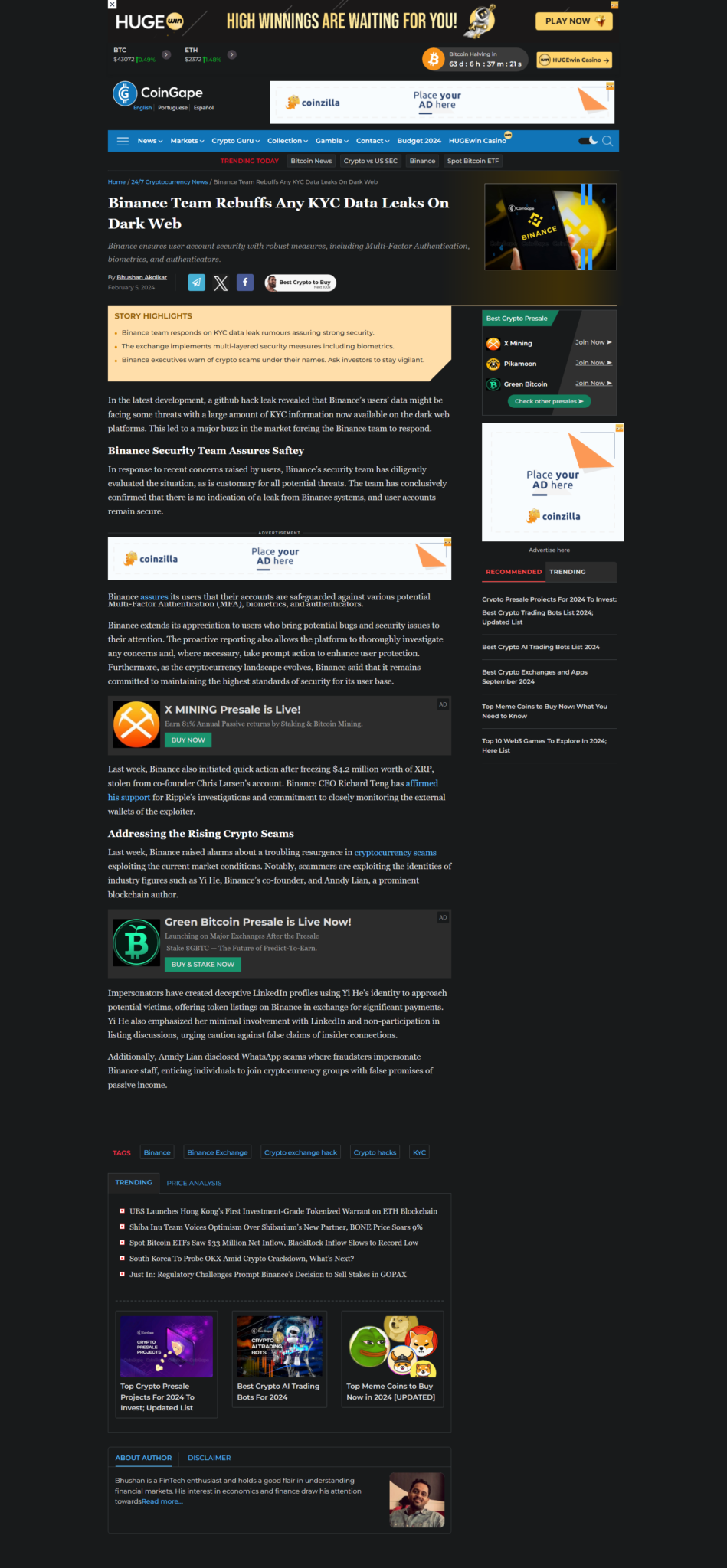A Nigerian federal high court has ordered Binance Holdings Limited to provide the Economic and Financial Crime Commission (EFCC) with comprehensive data and trade history of all Nigerians trading on its platform.
Justice Emeka Nwite gave the interim ruling on February 29, 2024, following an ex-parte motion raised by Ekele Iheanancho, the EFCC’s legal attorney.
Data to Unravel Money Laundering by Nigerians on Binance
According to local news outlet Punch, the court interim order was granted to allow the EFCC to investigate alleged money laundering violations and terrorism financing activities processed by Nigerians on Binance.
This means the anti-financial crime agency has the legal backing to request and access Nigerian traders on the exchange and conduct investigations.
Nonetheless, it is worth noting that Justice Nwite’s ruling stemmed from an ex-parte motion filed by the EFCC, which was based on specific sections of the Nigerian constitution.
This includes Sections 6(b), (h), (I), 7(1), (a)(2), and 38 of the EFCC Act, 2004. Other are Section 15 of the Money Laundering (Prevention and Prohibition) Act, 2022 (as amended) and the inherent powers of the court.
The highlighted legal provisions mandated the report of suspicious transactions to the Nigerian authorities and penalties for non-compliance.
The ex-parte motion filed by the EFCC claimed that Binance trading activities in the Nigeria region feature obvious elements of criminality.
An Affidavit was also filed by Hamma Bello, an operative of the anti-graft agency and member of its Special Investigation Team (SIT) within the Office of the National Security Adviser (ONSA). This was in support of the motion brought forward by the EFCC.
According to local news media, the filed document stated that the EFCC received intelligence on money laundering and terror financing on Binance. This led to the commencement of a thorough investigation by the EFCC.
Nigeria Trading Volume On Binance Capped at $21.6 Billion for 2023: The Looming Danger
Bello further stated that Binance’s request and compliance to release detailed data on Nigerian traders on Binance is of the utmost public interest and national security.
According to him, “The team uncovered users who have been using the platform for price discovery, confirmation, and market manipulation, which has caused tremendous distortions in the market, resulting in the Naira losing its value against other currencies.”
Bello reiterated that the damage caused by the Binance was clearly explained to the representatives of the exchange.
It could be recalled that the Central Bank of Nigeria (CBN) Governor, Olayemi Cardoso, accused Binance of facilitating $26 billion of illicit funds in Nigeria in 2023.
Meanwhile, the crypto exchange has proceeded to release trading volume data by Nigerians for 2023, which is capped at $21.6 billion.
This was closely followed by a request to delist the Naira on March 5 to mitigate depreciation.
As the case unfolds, crypto enthusiasts, investors, and experts in Nigeria believe the exchange won’t succumb to Nigeria’s court demands.
This is because an act of meeting the demands of the court would go against the ethos of cryptocurrency and decentralization.
Dialogue or Sanction: Will Crypto Win?
Case observers believed the potential exit of Binance from Nigeria looms and could affect the growth of cryptocurrency and blockchain technology in the country.
According to Anndy Lian, a blockchain expert, Nigeria had the world’s highest proportion of crypto users.
Between June 2022 and June 2023, it had a 9% year-over-year growth of $56.7 billion in crypto transactions.
However, these figures could drop if the world’s largest crypto exchange by trading volume restricts trading operations in Nigeria.
While the Nigerian government and the EFCC believe this will help the Naira gain more value, citizens have shared concerns about basic blame games and lost priorities.
If a dialogue between both parties does not happen soon, Nigerian traders may have to look for other alternatives for their trading needs.


Anndy Lian is an early blockchain adopter and experienced serial entrepreneur who is known for his work in the government sector. He is a best selling book author- “NFT: From Zero to Hero” and “Blockchain Revolution 2030”.
Currently, he is appointed as the Chief Digital Advisor at Mongolia Productivity Organization, championing national digitization. Prior to his current appointments, he was the Chairman of BigONE Exchange, a global top 30 ranked crypto spot exchange and was also the Advisory Board Member for Hyundai DAC, the blockchain arm of South Korea’s largest car manufacturer Hyundai Motor Group. Lian played a pivotal role as the Blockchain Advisor for Asian Productivity Organisation (APO), an intergovernmental organization committed to improving productivity in the Asia-Pacific region.
An avid supporter of incubating start-ups, Anndy has also been a private investor for the past eight years. With a growth investment mindset, Anndy strategically demonstrates this in the companies he chooses to be involved with. He believes that what he is doing through blockchain technology currently will revolutionise and redefine traditional businesses. He also believes that the blockchain industry has to be “redecentralised”.



